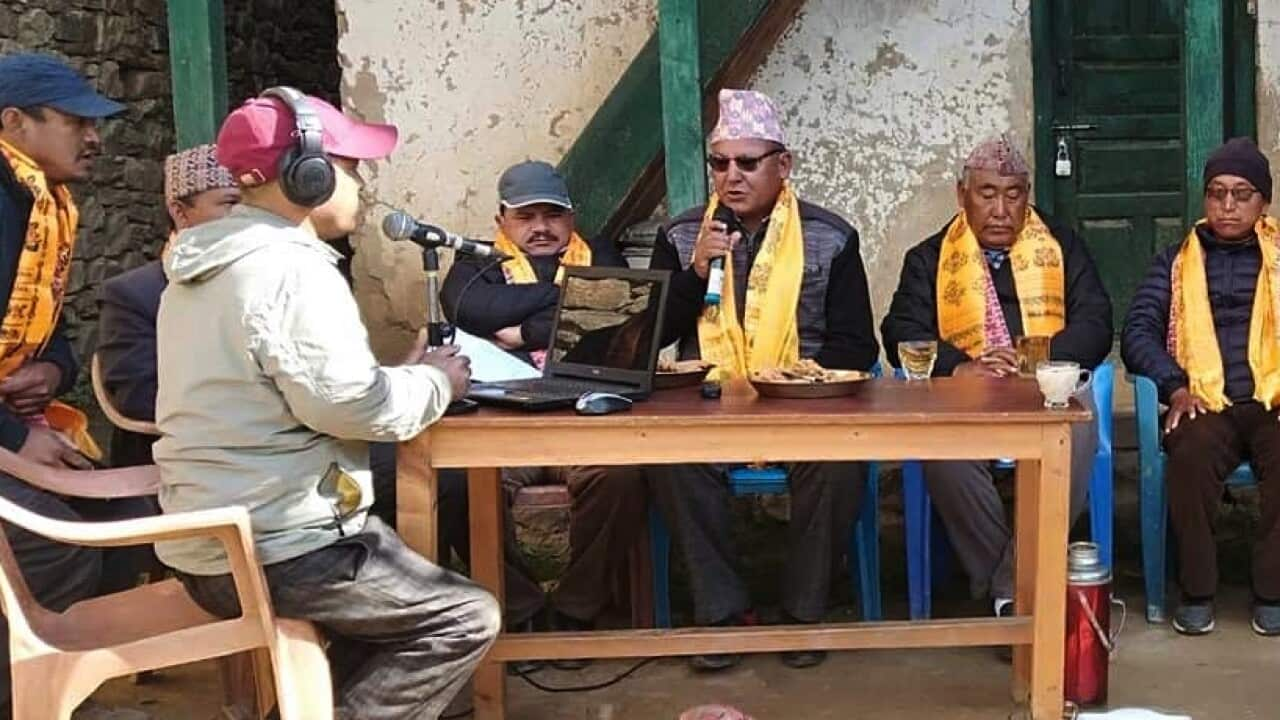While school students in Australia took advantage of online learning due to physical distancing measures, their counterparts in Nepal’s northwest district of Humla don’t have access to computers or the internet.
Due to COVID-19 restrictions, the country is currently under nationwide lockdown until at least June 14, almost three months after the lockdown laws were first announced.
Sydney-based Adara Development has been running health and education programs in Humla for the last 22 years. As a part of its educational development program, the organisation has been broadcasting tuition classes for Year 10 students, to help them prepare for their school exams.
It also broadcasts awareness programs on child trafficking, where girls are often sold to India or brought to the capital, Kathmandu and put in an orphanage or used as servants. However, when the coronavirus pandemic hit, the organisation decided to improvise and is now providing four hours of free lessons, six days a week via two FM radio stations for school students in the district.
However, when the coronavirus pandemic hit, the organisation decided to improvise and is now providing four hours of free lessons, six days a week via two FM radio stations for school students in the district.

Distance learning radio program launched by Adara in Nepal Source: Supplied
“When schools were shut, with very limited internet and no opportunity for Zoom classes or other digital learning, we had to figure out how we could use existing technology,” says Madeline Vaughan, Adara’s senior program director.
Since its launch on May 14, the distance education project has been running hour-long radio classes each focusing on Maths, Science, English and Social Studies for students in Years 5, 8 and 10.
With four local teachers going on air, one for each subject, students can call in a hotline number and speak directly to teachers.
Ms Vaughan says despite Adara currently work in eight schools in Humla, the radio program could help up to 17,000 students in the district.
“It’s about trying to find a way to maintain some normality for students during the pandemic and give them access to education. Making sure these students aren’t disadvantaged,” she says. But many students don’t have access to radio or home learning kits, including pens and notebooks.
But many students don’t have access to radio or home learning kits, including pens and notebooks.

Madeline Vaughan in Nepal Source: Supplied
“That’s one of our challenges”, explains Kanjok Lama, Adara Development’s education officer looking after the radio program.
Apart from providing scholarships to students, they are now also working to provide audio listening devices including radio or mp3 players for students who don’t have access to the audio service.
This support is scheduled to continue for the next six months but with many changes expected in the post-pandemic world, Madeline Vaughan says their radio service may provide educational support for the wider community.
Philanthropic work in Nepal
Adara Development is part of the Adara Group, founded by philanthropist Audette Exel AO, more than 22 years ago. As well as philanthropy the other part of the organisation focuses on corporate advisory businesses.
“The role of these businesses is to generate funds to ensure that Adara Development is able to do its most important work,” says Ms Exel, who in 2013 was awarded an Honorary Order of Australia for her work to provide “specialist care to women and children in Uganda and Nepal.”
“Over the course of the last 22 years, we’ve put $45 million towards our work with people and poverty. And about $16 million has come out of our businesses,” she tells SBS Nepali. Like the changes in Adara’s radio broadcasting in Nepal after the coronavirus pandemic hit the country, Audette Exel says the pandemic will also change the way people will step up to provide more support.
Like the changes in Adara’s radio broadcasting in Nepal after the coronavirus pandemic hit the country, Audette Exel says the pandemic will also change the way people will step up to provide more support.

Audette Exel in Nepal Source: Jonathan Torgovnik
“One thing COVID-19 has shown us is that we’re all connected from one end of the globe to the other. And the health and safety of individuals is connected directly to the people here in Australia.”
“The time is now for philanthropic community, more than ever before,” she says.
Philanthropy or marketing
After Nepal’s devastating earthquake in 2015, Adara Development started working in Gyangfedi, another remote village in Nuwakot district, near the capital Kathmandu.
It currently supports eight schools there. Having worked alongside local partners in Nepal and Uganda for more than two decades, Audette Exel says she understands the concerns around the use of philanthropy for marketing purposes.
Having worked alongside local partners in Nepal and Uganda for more than two decades, Audette Exel says she understands the concerns around the use of philanthropy for marketing purposes.

House damaged in Nepal earthquake Source: Getty Images
“Philanthropy comes with serious responsibility and promoting such activities should be done in a developmentally appropriate way.”
Named as Australia’s leading philanthropist by Philanthropy Australia, Ms Exel points out that she is not in the business of pointing fingers and telling people how they should or shouldn’t give.
“The highest order of giving is without attachment and without the need for any personal gratification.
“Authenticity sits at the heart of leadership. We need philanthropy not to be a marketing exercise. We need companies not to talk about what they do, led by their marketing department but put action before words,” she adds.
